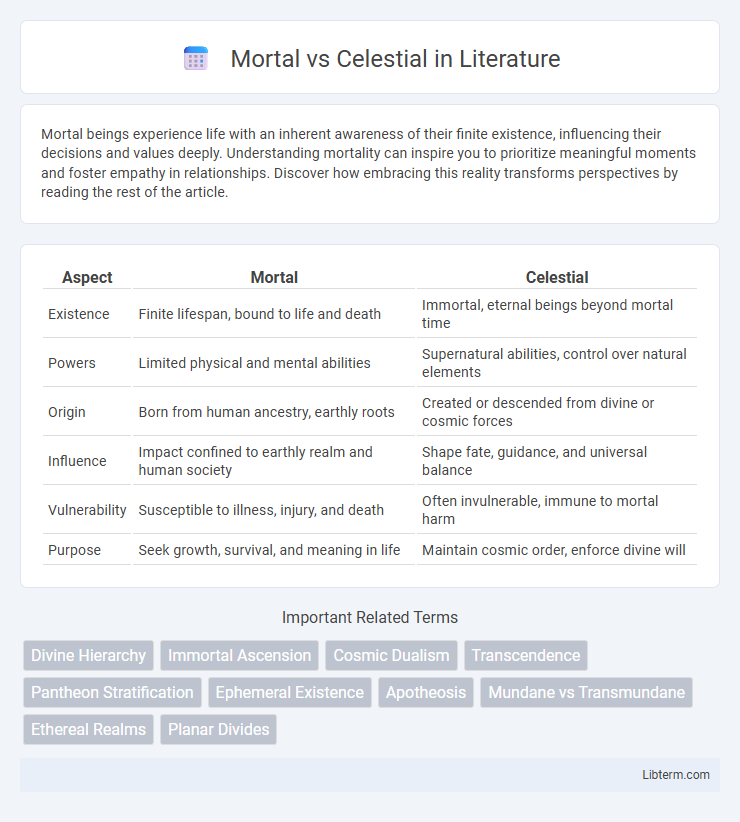Mortal beings experience life with an inherent awareness of their finite existence, influencing their decisions and values deeply. Understanding mortality can inspire you to prioritize meaningful moments and foster empathy in relationships. Discover how embracing this reality transforms perspectives by reading the rest of the article.
Table of Comparison
| Aspect | Mortal | Celestial |
|---|---|---|
| Existence | Finite lifespan, bound to life and death | Immortal, eternal beings beyond mortal time |
| Powers | Limited physical and mental abilities | Supernatural abilities, control over natural elements |
| Origin | Born from human ancestry, earthly roots | Created or descended from divine or cosmic forces |
| Influence | Impact confined to earthly realm and human society | Shape fate, guidance, and universal balance |
| Vulnerability | Susceptible to illness, injury, and death | Often invulnerable, immune to mortal harm |
| Purpose | Seek growth, survival, and meaning in life | Maintain cosmic order, enforce divine will |
Defining Mortal and Celestial: Key Differences
Mortals are finite beings characterized by limited lifespans, physical vulnerabilities, and susceptibility to aging and death, fundamentally tied to the earthly plane. Celestials, on the other hand, are immortal or near-immortal entities often associated with divine or supernatural realms, possessing extraordinary powers beyond human capabilities. The key distinctions lie in mortality, origin, and the scope of influence, where mortals experience existence bound by time, while celestials transcend physical limitations with eternal presence and cosmic significance.
Historical Perspectives on Mortals and Celestials
Historical perspectives on mortals and celestials often depict mortals as vulnerable beings subject to fate and divine intervention, while celestials are portrayed as powerful, immortal entities governing cosmic order. Ancient mythologies and religious texts from cultures such as Greek, Hindu, and Chinese traditions emphasize the hierarchy between mortal humans and celestial gods or spirits, highlighting interactions that shape human destiny and moral lessons. These narratives reveal enduring themes of mortality, divinity, and the quest for transcendence within human history.
The Origins of Mortal and Celestial Beings
Mortal beings originate from organic and earthly substances, shaped by biological evolution and natural processes, often bound by time and physical limitations. Celestial beings emerge from divine or cosmic energies, existing beyond natural laws and embodying supernatural power, immortality, and higher consciousness. The distinct origins of mortals and celestials highlight the fundamental divide between temporal life and eternal existence in mythology and cosmology.
Powers and Abilities: Mortal vs Celestial
Celestials possess god-like powers, including immortality, cosmic energy manipulation, and reality-altering abilities, far surpassing the limited physical and magical capabilities of mortals who rely on skill, training, and occasional supernatural enhancements. Mortals exhibit diverse powers such as agility, strength, and elemental magic, but they remain vulnerable to death and exhaustion, unlike Celestials who regenerate rapidly and withstand extreme damage. The vast disparity in cosmic awareness and energy control marks the defining distinction between Mortal and Celestial powers and abilities.
Mortal Limitations vs Celestial Potential
Mortals are bound by physical constraints such as limited lifespan, vulnerability to injury, and finite cognitive capacities, which restrict their ability to access supernatural knowledge or powers. Celestials possess inherent immortality, enhanced strength, and profound wisdom, enabling them to manipulate cosmic forces and transcend mortal boundaries. This stark contrast highlights the mortal struggle for survival and growth against the celestial embodiment of infinite potential and divine authority.
Mythology and Legends Surrounding Celestials
Celestials in mythology are often depicted as divine beings or gods with immense power, representing forces of nature or cosmic order. Legends describe Celestials as guardians of the universe, wielding supernatural abilities that surpass mortal limits and influencing fate and destiny. These mythological figures are frequently associated with creation stories, celestial realms, and eternal wisdom, symbolizing the contrast between mortal impermanence and divine eternity.
Human Aspirations: The Mortal Quest for the Celestial
Human aspirations often manifest as a profound quest to transcend mortal limitations and reach celestial heights, symbolizing the desire for immortality, enlightenment, and divine connection. This pursuit drives advancements in philosophy, science, and spirituality, reflecting the innate human yearning to bridge the finite and the infinite. Cultural myths and modern narratives consistently explore the tension between earthly existence and celestial transcendence, underscoring the universal quest for meaning beyond mortality.
Cultural Interpretations of Mortals and Celestials
Cultural interpretations of mortals and celestials vary widely, with mortals often depicted as vulnerable yet heroic beings embodying human struggles and emotions, while celestials are portrayed as divine, immortal entities symbolizing power, wisdom, and cosmic order. In mythologies such as Greek and Hindu, celestials hold dominion over natural and supernatural realms, influencing the fate of mortals through divine intervention or moral guidance. Artistic and literary traditions explore these dynamics to reflect societal values, illustrating the contrast between mortal limitations and celestial transcendence.
Mortal-Celestial Conflicts in Literature and Media
Mortal-celestial conflicts in literature and media often explore the tension between human limitations and divine power, highlighting themes of hubris, fate, and redemption. These narratives feature mortals challenging gods or celestial beings, as seen in works like "Percy Jackson & the Olympians" and Neil Gaiman's "American Gods," where divine interference dramatically shapes mortal destinies. The recurring clash emphasizes the fragile boundary between earthly agency and supernatural authority, fostering rich storytelling that questions morality and free will.
Bridging the Gap: When Mortals Become Celestial
Mortals ascend to celestial status by undergoing transformative spiritual awakenings and harnessing cosmic energies, bridging the gap between earthly existence and divine realms. This metamorphosis often involves mastering celestial knowledge, transcending physical limitations, and embodying higher virtues that align with celestial entities. The process signifies a profound evolution where mortal souls integrate celestial attributes, enabling interaction with ethereal dimensions and influencing cosmic balance.
Mortal Infographic

 libterm.com
libterm.com